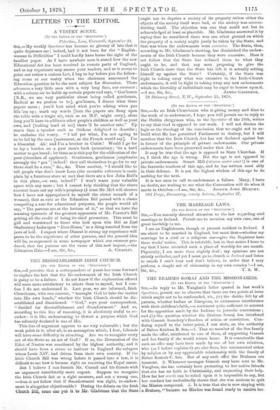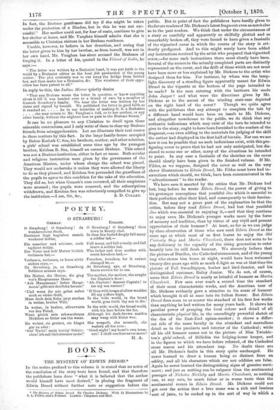THE BRAHMO SOMAJ AND THE MISSIONARIES. [To THE EDITOR OF
THE "SPECTATOR."] Sm,—In reply to Mr. Vaughan's letter quoted in last week's Spectator, permit me to observe that there are two points at issue which ought not to be confounded, viz., (a) the dislike felt by all parents, whether Indian or European, to extraneous interference with their children's faith,—a sentiment quite sufficient to account for the opposition made by the Indians to juvenile conversions ; and (b) the question whether the Brahmo Somaj has interfered with Gunesh Soondery's freedom of action or conviction. Con- fining myself to the latter point, I can state, on the authority of Baboo Krishna B. Sen,-1. That no member of the Sen family made the offer, attributed to cue of them, of supporting Gunesh and her family if she would return home. It is conceivable that such an offer may have been made by one of her own relatives, who (as I before explained) are also Sens, but unconnected either by religion or by any appreciable relationship with the family of Baboo Keshub C. Sen. But of any such offer the Brahmos are innocent. 2. Whatever messages Gunesh may have sent to Mr. Vaughan, she has certainly been protesting to her native friends that she has no faith in Christianity, and requesting their help. How far her words can be relied upon it is impossible to say, but her conduct has undoubtedly shown that she was anxious to quit the Mission compound. 3. It is true that she is now staying with a Brahmo, " becalm no Bandoo was found ready to receive her. In fact, the Brahmo gentleman did try if she might be taken
under the protection of a Hindoo, but in this he was not suc- cessful." Her mother could not, for fear of caste, continue to give
her shelter at home, and Mr. Vaughan himself admits that she is accessible to Christian visitors in her Brahmo residence.
Unable, however, to believe in her desertion, and seeing that the letter given to him by her brother, as from herself, was not in her own hand, Mr. Vaughan has since accused the Brahmos of forging it. In a letter of his, quoted in the Friend of India, ho says :—
"The letter was written by a Brahmist hand, it was put forth to the world by a Brahmist editor as the bowl fide production of the young widow. The plot evidently was to cut away the bridge from behind her, and then make her a Brahmica, &c. The virulence of their oppo- sition has been patent to all."
In reply to this, the Indian Mirror quietly denies
"That any Brahmo wrote the letter in question, or knew anything about it till it was handed over to a friend of ours by a member of Gunesh Soondery's family. We hear the letter was written by her sister and signed by herself. We published the letter in good faith as it reached us As to our intention of making G. S. a Brahmica . . . . she may return to Mr. Vaughan's fold, or to her mother, or any other family, without the slightest loss or gain to the Brahmo Somaj."
It can be no pleasure to any Christian to dwell upon these miserable contentions, and I only write of them to clear my Brahmo friends, from misapprehension. Let me illustrate their real course in these matters by this fact. In the large family-house occupied by Baboo Keshub C. Sen, his brothers, mother, and other relatives, a girls' school was established some time ago by the youngest brother, Krishna B. Sen, himself an earnest Brahmo. This school was not a Brahmo institution, either in fact or name. Both secular and religious instruction were given by the governesses of the American Mission, under whose charge the school was placed.
They would not undertake it unless they were allowed the liberty to do as they pleased, and Krishna Sen persuaded the guardians of the pupils to agree to this condition for the sake of the education. They did so, but when Gunesh's case occurred, all their suspicions were aroused ; the pupils were removed, and the subscriptions withdrawn, and Krishna Sen was reluctantly compelled to give up































 Previous page
Previous page